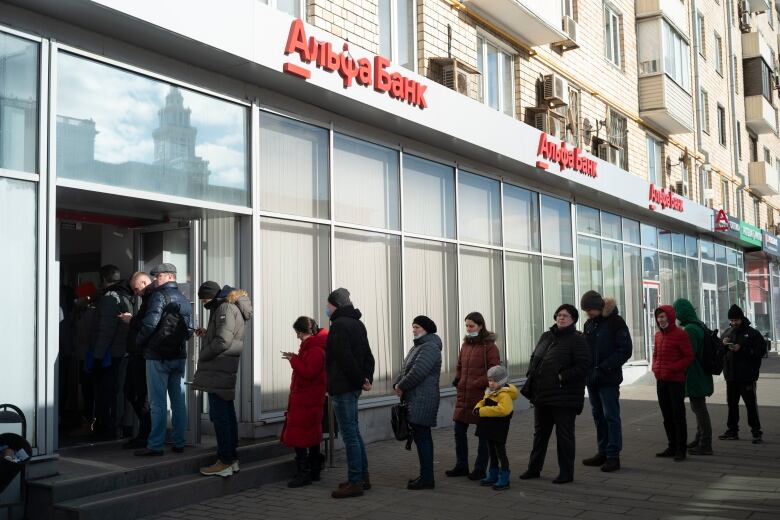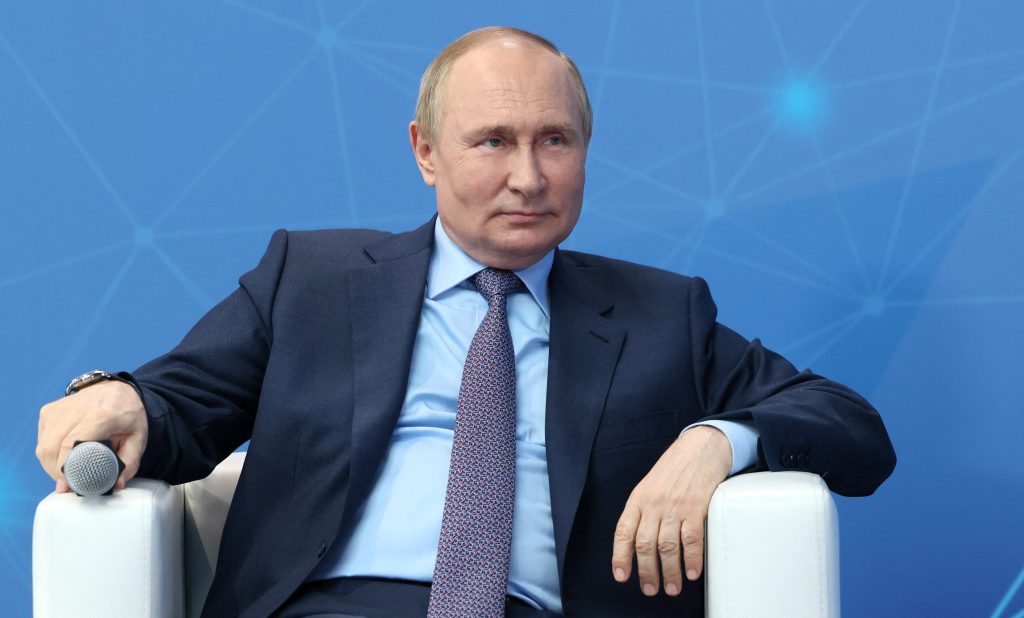Canada’s economic measures against Russia — which are meant to target the assets of wealthy oligarchs and government officials — are hitting the personal finances of people with no ties to the Putin regime, CBC News has learned.
Some Canadian residents who have no connections to the Russian government and don’t support President Vladimir Putin’s war on Ukraine say their personal savings have been frozen because of how Global Affairs Canada administers its sanctions.
Acting in tandem with other Western allies, Canada has been blocking all financial dealings and freezing Canadian-held accounts linked to a list of sanctioned individuals and business entities — a list that now runs to over 2,100 names.
CBC News has spoken to four individuals who are not named on this list and are not accused of supporting Putin’s regime. They say they can’t access tens of thousands of dollars in personal savings because the major banks they and their families dealt with in Russia and Kazakhstan were caught up in Canada’s sanctions.
“I support Ukraine in this. A lot,” said Natasha, who’s originally from Belarus but moved to Saint Petersburg for university. She said she and her husband were offered jobs in Canada’s tech sector and left Russia in 2020, looking for a “better and safer life.”
CBC News has agreed not to use her last name or show her face because she’s concerned about her job security.
Natasha and her husband have applied for, but have not yet received, permanent residency in Canada. Because of the strong emotions the war in Ukraine evokes, she said, she also fears online harassment.
In the weeks before Russia invaded Ukraine, Natasha worried about losing the savings she and her husband left behind in Alfa-Bank, Russia’s largest private bank — between $80,000 and $133,000 Cdn, she said.
“Because of the history of where I come from, I just thought that it would be very risky to have anything there,” she said.
She began the process of moving her money to a Canadian account. But the transfer wasn’t complete by Feb. 24 — when Ottawa’s sanctions barred Canadians from doing business with Alfa-Bank. Her money was blocked and frozen.
Her application for an exemption is now part of a growing backlog at Global Affairs, as non-sanctioned individuals plead for ministerial permits to release their personal savings.
“Maybe [Canadian government officials] don’t have enough time to dig into this and to actually see that regular people who are already here, who pay taxes and work hard and are part of this community here, are also affected. And it’s just not fair,” Natasha said.
It’s also not clear that the impact of Canada’s sanctions on non-oligarchs like Natasha is actually accomplishing anything.
‘Absolutely unfair’
“When we look at the purpose of economic sanctions … they are implemented to change behaviour, and in this case to change the behaviour of the Putin regime regarding the invasion and continued war in Ukraine,” said John Boscariol, a trade lawyer who represents businesses and individuals affected by sanctions regulations. (He has not been retained by any of the individuals interviewed for this story.)
“Freezing these personal remittances … [for example] that happened to be sent by grandparents to their grandchildren, do not change and will never change the behaviour of the Putin regime,” he said. “It’s just an untenable situation and absolutely unfair for those that are caught up in it.”

Last month, the RCMP reported that over $122 million Cdn in Canadian assets had been frozen since Russia invaded.
But the RCMP’s tracking doesn’t distinguish between the wealth of oligarchs and the more modest savings Natasha and her husband hoped to use for a down payment on a home.
They aren’t the only small fish caught up in Ottawa’s sanctions net.
Svetlana’s employer transferred her from Moscow to Toronto in 2021. She recently became a permanent resident of Canada. Fearing both for her employer and her personal security, she also asked that her surname and image not appear in this article.
“While I was opening my first bank account, which was obviously one of the first things you do when you come to a new country, I was told that if anything’s wrong with my work permit, then my account’s going to be terminated,” she said.
That’s why she left about $39,000 Cdn in personal savings behind in Russia — a nest egg she reported to Canadian officials during her immigration process to prove she had the means to support herself.
A ‘night full of tears’
“I had signs of severe depression. Life back in Russia was not easy,” Svetlana said. “After I moved to Canada, I had hopes that I could build a better life here. Less stressful, at least.”
A doctor advised her not to follow the news too closely to help manage her stress. On the night Russia invaded Ukraine, she was out for dinner with a Ukrainian friend.
“I got back home and he texted me: ‘Do not read anything. Do not open newsfeeds. Like, just don’t do it.’ And of course I did that immediately after I got that message,” she said.
After a “night full of tears,” she said, she contacted her Alfa-Bank branch back in Russia at 3 a.m. Toronto time to pull her money out. Mere hours later, Prime Minister Justin Trudeau and his ministers stepped in front of microphones to announce Canada’s new sanctions.
Svetlana’s money never arrived. Just like Natasha’s, it was blocked in transit and never reached her Canadian account — but Alfa-Bank says it no longer holds it. She’s struggled to figure out what happened.

Alfa-Bank suggested to her weeks later that her transfer “most likely” was frozen by the Canadian government. It directed her to a website where she could apply for an exemption.
Global Affairs Canada confirmed it received her application but never explained why her savings are frozen. Svetlana said the only feedback she got from the department was an auto-reply e-mail thanking her for her patience as the department faces a backlog of requests.
“What frustrates me the most is that I don’t see any actions. They do not communicate, they do not provide any time estimations, so we just don’t know what to expect,” she said.
“I did nothing wrong.”
Russian citizens aren’t the only ones being kept from their savings by Canadian sanctions.
Darya — who also spoke to CBC News on the condition that her last name be withheld — is working and raising two young kids, aged five and eight, with her husband in Winnipeg. Their immigration was approved under the provincial nominee program earlier in the pandemic, but they couldn’t move to Canada from Kazakhstan until near the end of 2021.
Darya said she doesn’t support Vladimir Putin either. Her mother is of Ukrainian descent.
When they sold their property in Kazakhstan, they brought some of the proceeds with them and left the rest with Darya’s brother, to transfer later.
When they needed the rest of their money, her brother discovered that only one local bank could send a Swift transfer abroad: Sberbank Kazakhstan, a subsidiary of a Russian state-owned bank that’s been blacklisted by Canada.
Although it was once part of the Soviet Union, Kazakhstan is now an independent country with its own financial system. The bank told her brother that Canadian sanctions would not affect the transfer. But the funds never made it to Darya’s account in Canada.
She applied to Global Affairs for an exemption to release the money — tens of thousands of dollars — in late March. The department told her that her application would be considered. Since then, silence.
“Now it has been ten months and we have nothing,” Darya said. “For us, it’s a large amount of money, and we earned this money in Kazakhstan.”
She said she and her husband were turned down for a Canadian mortgage because they didn’t have enough for a down payment.
“My immigration now … it’s not so pleasant,” she said.
‘We’re slowly losing hope’
Madina Muslimova is another permanent resident of Canada who moved to Toronto from Kazakhstan in 2018.
She’s now working while raising a toddler on her own. She hopes to return to school to do a master’s degree. Her parents, now in their 70s, recently sold some assets so they could help her out financially.
Her mom has a visitor’s visa and comes to help out, but she requires medical treatment that the family must pay for out of pocket while she’s in Canada. Which is why her family tried to move a six-figure sum into Madina’s Canadian account.
Just like Darya, they learned the hard way that Sberbank Kazakhstan wasn’t excluded from Canada’s regulations.
“My parents chose that bank,” Madina said. “It was just across the street … they thought it was stable.”
The Kazakh subsidiary was sold and rebranded last summer to escape from Russian sanctions, but that move came too late for Madina’s family — their funds appear to be frozen too.
“I still have not received any clarification about where my funds are,” Madina said. “We relied on that money … I think we’re slowly losing hope, to be honest.”
CBC News asked Foreign Affairs Minister Mélanie Joly what her department was doing to manage its backlog of sanctions exemption requests.
“Our goal is to really target Putin and his enablers. That has been our strategy for Canada [and] for all our allies as well,” the minister said.
“When it comes to individual cases, we’ll do what will work on a case by case basis. You want to make sure that the essence of our approach is respected. And we want to make sure that we have a human approach.”
In a written statement sent to CBC News in December, Global Affairs said that while it cannot speak about individual applications, it “is not seeking to confiscate assets owned by non-listed individuals or entities.”
But how long will it take the department to run due diligence and release the savings belonging to Natasha, Svetlana, Darya and Madina?
“They are really being treated as collateral damage,” Boscariol said.
He said he believes Global Affairs now has a backlog of over 500 applications, with limited resources to tackle it.
Last November, Boscariol appeared before a Senate committee as an expert witness on sanctions measures. He gave the department a failing grade for its administration, saying Canada is missing opportunities to put in place more effective compliance measures.
“There’s some good lessons we could learn from our allies on this in the United States and the United Kingdom,” he told CBC News.
The European Union, for example, has exempted personal remittances for people who don’t own sanctioned companies and aren’t government officials.
Boscariol said he also believes Canada could issue a general licence to cut its backlog much faster.
“Our quarrel is not with the people of Russia,” Prime Minister Trudeau said on the day these sanctions were announced. “It is with President Putin and Russian leadership that has enabled and supported this further invasion of Ukraine.”
“I’m a Canadian resident and these sanctions affected us heavily,” Natasha told CBC News. “So I don’t know how to react to that.”
Source : CBC


